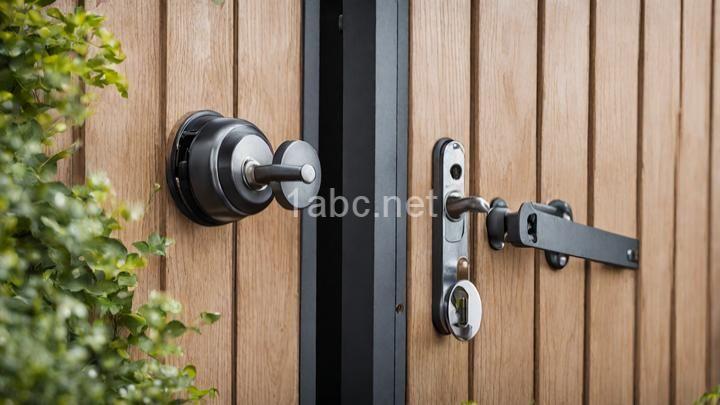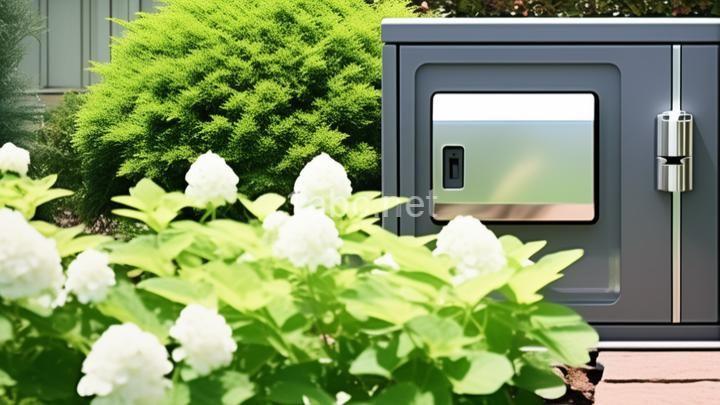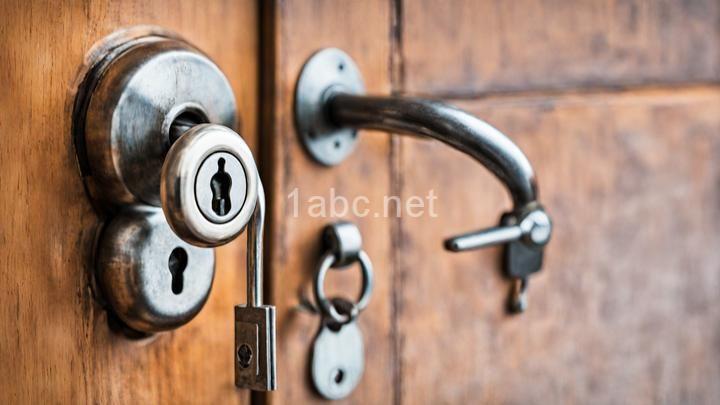Securing Your Garden: Tips for Maintaining and Upgrading Garden Gate Locks

Introduction:
Hey there, fellow garden enthusiasts! We're so thrilled to have you here as we dive into the world of garden gate security. We know that maintaining a beautiful garden is no small feat, and protecting it from trespassers and unwanted visitors is just as important. So, let's roll up our sleeves and explore some tips and tricks to secure your garden gates!
Garden gates are not just a decorative feature but also play a crucial role in safeguarding your beloved plants and ensuring your privacy. By fortifying your garden gate locks, you can create a barrier that not only deters intruders but also adds an extra layer of protection to your outdoor sanctuary.
I. Assessing Your Current Garden Gate Lock
Before we embark on the journey of upgrading your garden gate locks, it's essential to evaluate the current state of your existing ones. Take a moment to inspect your lock for any signs of wear, rust, or damage. A quick examination will give you a better understanding of its condition and help you determine if a maintenance or upgrade is necessary.
Furthermore, don't forget to test the functionality of your lock. Is it smooth to operate, or does it give you a hard time? Ensuring that your lock is in proper working condition is crucial for maintaining the security of your garden.
II. Basic Maintenance Tips for Garden Gate Locks
Now that you've assessed the condition of your garden gate lock let's move on to some basic maintenance tips that will keep it in top-notch shape.
A. Cleaning and Lubricating the Lock Mechanism
Just like any other mechanical device, garden gate locks can accumulate dirt and debris over time, hindering their performance. To combat this, we recommend giving your lock a good cleaning. Grab a mild detergent and a soft brush to gently scrub away any grime that may have found its way into the lock mechanism. Be sure to rinse it thoroughly and dry it well to prevent rusting.
After your lock is squeaky clean, it's time to give it a little extra TLC. Apply a lubricant to the lock mechanism to ensure smooth operation. This will not only prevent any potential sticking but also extend the lifespan of the lock.
B. Tightening Loose Screws
Loose screws can be the Achilles' heel of your garden gate security. They not only compromise the functionality of your lock but also make it easier for intruders to tamper with your gate. To avoid this, regularly check and tighten any loose screws on your gate lock. Be sure to follow proper tightening techniques to avoid damaging the lock mechanism. Remember, there's a fine line between a snug fit and overtightening!
III. Upgrading Your Garden Gate Lock
If your current garden gate lock is beyond repair or you're simply looking to enhance your garden's security, it might be time to consider upgrading. Here are some fantastic options to explore:
A. Choosing a Sturdy Lock Type
When it comes to choosing a lock for your garden gate, there are several options available. Padlocks and deadbolts are two popular choices that offer sturdy security. Padlocks are versatile and come in various sizes and designs to suit different gate materials. Deadbolts, on the other hand, provide a higher level of security and are often more resistant to tampering.
When selecting a lock type, consider the material of your gate as well. Wooden gates may require different locks compared to metal gates, so be sure to choose one that is compatible with your gate material.
B. Installing Keyless Entry Systems
If you're looking for a more convenient and advanced option, keyless entry systems might be just what you need. These systems eliminate the need for traditional keys, allowing you to enter your garden with a simple code or even through biometric authentication. Talk about feeling like a secret agent every time you step into your garden!
Keyless entry systems can also be integrated with home automation technology, giving you the ability to control and monitor your garden gate security from your smartphone or tablet. It's like having your own personal gatekeeper, always at your service!
C. Reinforcing Gate Structure
While upgrading your lock is essential, reinforcing the overall structure of your garden gate is equally important. Consider installing sturdy hinges that can withstand the test of time and potential intruders. Reinforcing your gate frames with metal plates or braces can also add extra strength and durability. And if you want to take it up a notch, why not add extra bars or chains for an added layer of security?
IV. Tips for Enhancing Overall Garden Security
Now that we've covered garden gate locks let's not forget about the bigger picture – overall garden security. Here are some additional tips to ensure your garden remains a safe and protected haven:
A. Outdoor Lighting Solutions
Proper lighting can make a world of difference when it comes to deterring potential intruders. Consider installing motion-sensor lights around your garden gate or strategically placing garden lighting to illuminate dark corners. Not only will this enhance the security of your garden, but it will also create a beautiful ambiance during those evening strolls.
B. Landscaping and Natural Barriers
Nature has its own way of helping us secure our gardens. By strategically planting thorny shrubs or prickly plants around your garden perimeter, you can create natural barriers that discourage unwanted visitors. Plus, it adds a touch of natural beauty to your outdoor space!
Conclusion:
Congratulations on your commitment to securing your garden gate! By taking the time to assess and maintain your garden gate locks, you're not only protecting your precious plants but also ensuring your privacy and peace of mind. We hope the tips and suggestions we've shared will inspire you to take your garden security to the next level.
Remember, maintaining a secure garden doesn't have to be a daunting task. With a little bit of TLC and some smart upgrades, you can transform your garden gate into a fortress that keeps unwanted intruders at bay. So go ahead, unleash your inner security guru, and create a garden that's not only beautiful but also safe and secure!
Happy gardening!
FREQUENTLY ASKED QUESTIONS
What are the advantages of securing my garden with gate locks?
Securing your garden with gate locks offers several advantages. Firstly, it enhances the overall security of your property. By installing gate locks, you create an additional barrier that deters potential intruders and provides peace of mind. This is especially important if you have valuable items or equipment stored in your garden.Secondly, gate locks help to control access to your garden. You can choose who enters your property by providing keys or codes only to trusted individuals. This can be particularly useful if you have children or pets, as it ensures they stay safe within the confines of your garden.
Furthermore, gate locks can help prevent nuisance or unauthorized entry. They discourage trespassers from using your garden as a shortcut or loitering on your property. This can improve your privacy and maintain a peaceful environment.
In addition, securing your garden with gate locks can also act as a deterrent against wildlife or stray animals. It reduces the risk of damage to your plants, flowers, or lawn caused by roaming animals.
Overall, gate locks offer numerous benefits, including increased security, controlled access, privacy, and protection against wildlife. By investing in gate locks, you can create a safer and more secure environment for yourself and your loved ones.
How often should I maintain my garden gate locks?
To ensure the security and functionality of your garden gate locks, regular maintenance is recommended. It is advisable to check and maintain your garden gate locks at least once every six months. This schedule allows you to identify any potential issues or signs of wear and tear before they escalate into major problems.During your maintenance routine, inspect the locks for any visible damage, such as rust or loose screws. Clean the locks using a mild detergent and a soft cloth to remove any dirt or debris that may have accumulated. Lubricate the moving parts of the locks with a spray lubricant or graphite powder to ensure smooth operation.
Additionally, pay attention to the key and keyhole. Clean the key with a damp cloth and ensure it is not bent or damaged. If the key shows signs of wear, consider getting a replacement to prevent it from getting stuck in the lock.
Remember, it's crucial to address any issues promptly. If you notice any difficulties in locking or unlocking the gate or if the locks are becoming increasingly difficult to operate, it may be a sign that professional assistance is needed.
By maintaining your garden gate locks regularly, you can prolong their lifespan, enhance security, and prevent potential lockouts or malfunctions.
What are some signs that indicate my garden gate locks need upgrading?
There are several signs that can indicate that your garden gate locks may need upgrading. Here are a few things to look out for:
-
Difficulty in locking or unlocking: If you find it increasingly challenging to lock or unlock your garden gate, it could be a sign that the lock is wearing out or becoming damaged. This can happen over time due to regular use or exposure to the elements.
-
Loose or wobbly lock: If you notice that the lock feels loose or wobbly when you try to use it, it could be an indication that the lock mechanism is deteriorating. A loose lock can compromise the security of your garden gate and make it easier for unauthorized individuals to gain access.
-
Rust or corrosion: Over time, locks can become susceptible to rust or corrosion, especially when exposed to moisture or harsh weather conditions. If you notice any signs of rust or corrosion on your lock, it's a clear indication that the lock may need to be replaced.
-
Key-related issues: If you're experiencing difficulties with your key, such as it getting stuck or not turning smoothly in the lock, it could be a sign that the lock is worn out or needs maintenance. Ignoring these key-related issues can lead to more significant problems down the line.
-
Outdated or easily pickable locks: If your garden gate locks are old or outdated, they may be more susceptible to picking or tampering. Upgrading to a more modern and secure lock system can help improve the overall security of your garden.
It's important to prioritize the security of your garden, and upgrading your gate locks can provide you with peace of mind. If you notice any of these signs, it may be time to consider upgrading your garden gate locks to ensure the safety and protection of your property.
What types of garden gate locks are available?
There are several types of garden gate locks available to suit different needs and preferences. Here are some common options:
-
Padlocks: Padlocks are a popular choice for garden gates. They come in various sizes and designs, and can be attached to a hasp or a staple on the gate. It's important to choose a sturdy padlock made of durable materials to ensure security.
-
Mortice locks: Mortice locks are installed within the gate, providing a more secure option. They require a mortice cutout on the gate and frame for installation. Mortice locks are available in different security levels and styles, including key-operated and lever-operated options.
-
Combination locks: Combination locks are a convenient choice as they eliminate the need for keys. They typically consist of a dial or keypad that requires a specific combination to unlock the gate. Combination locks are available in various designs, including digital and mechanical options.
-
Keyless locks: Keyless locks offer an alternative to traditional locks. They use different methods for access, such as fingerprint recognition, keypad entry, or smartphone-controlled mechanisms. Keyless locks provide convenience and can enhance security.
-
Gate bolts: Gate bolts are simple yet effective locking mechanisms. They are typically installed on the inside of the gate and slide into a receiver or socket on the gatepost. Gate bolts are available in different sizes and designs, including spring-loaded options for easy operation.
When choosing a garden gate lock, consider factors such as security requirements, ease of use, durability, and weather resistance. It's also advisable to consult with a professional or a locksmith to ensure you select the most suitable lock for your specific needs.




